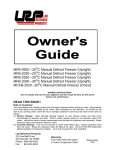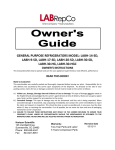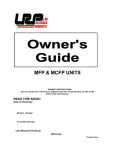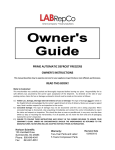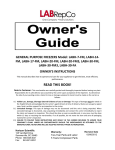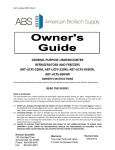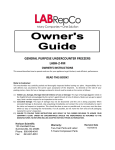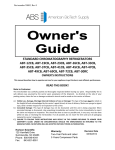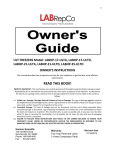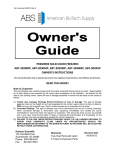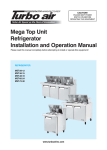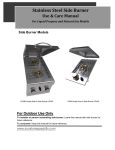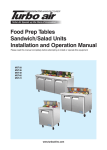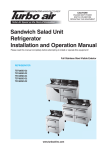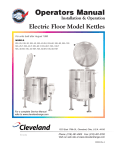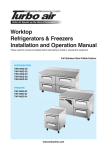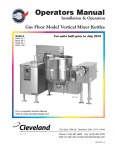Download premiere undercounter built in freezers abt-ucbi-0420, abt
Transcript
Part number 20067, Rev 0 PREMIERE UNDERCOUNTER BUILT IN FREEZERS ABT-UCBI-0420, ABT-UCBI-0420SS OWNER’S INSTRUCTIONS This manual describes how to operate and care for your appliance to get the best, most efficient, performance. READ THIS BOOK! Note to Customer: This merchandise was carefully packed and thoroughly inspected before leaving our plant. Responsibility for its safe delivery was assumed by the carrier upon acceptance of the shipment. As directed on the side of your packing carton, claims for loss or damage sustained in transit must be made on the carrier as follows: A.) Visible Loss, Damage, Shortage External Evidence of Loss or Damage: This type of damage must be noted on the freight bill and acknowledged by the carrier’s agent (driver) at time of delivery. Make sure you get a signed copy. Send a written request for an inspection to the carrier. B.) Concealed Damage: This type of damage may not be discovered until the unit is being unpacked. When concealed damage is discovered, stop unpacking immediately and contact the carrier immediately to report the claim and request an inspection. This should be done as soon as possible and, in any case, must be done within 15 days or receiving the merchandise. If at all possible, do not move the item and save all packaging material for carrier’s inspection. C.) FAILURE TO FOLLOW THESE INSTRUCTIONS MAY RESULT IN THE CARRIER REFUSING TO HONOR YOUR COMPANY’S CLAIM. UNDER NO CIRCUMSTANCES SHOULD THE MERCHANDISE BE RETURNED TO THE MANUFACTURER. NO RETURNS WILL BE ACCEPTED WITHOUT PRIOR AUTHORIZATION. Horizon Scientific 125 Varnfield Drive Summerville, SC 29483 Phone: 800-648-4041 Fax: 843-821-8051 Warranty: 1 Two-Year Parts and Labor 5 Years Compressor Parts Revision Date 08/24/2012 Part number 20067, Rev 0 TABLE OF CONTENTS RECEIVING .........................................................................................3 INSTALLATION INSTRUCTIONS............................................................4 FREEZER OPERATION..........................................................................6 ELECTRONIC TEMPERATURE CONTROL ...............................................7 QUICK TROUBLESHOOTING GUIDE ................................................... 10 MAINTENANCE AND CLEANING ........................................................ 12 PRODUCT WARRANTY INFORMATION .............................................. 15 BEFORE CALLING THE MANUFACTURER’S TECHNICAL SERVICE, please have the unit’s model and serial number ready as well as the problem description. The model and serial number is located on the serial tag which can be found on the interior left OR right upper wall of the unit. For convenience, you may want to record the following information here for easy access in the future. Model number: __________________________________ Serial number: __________________________________ Date of delivery: _________________________________ 2 Part number 20067, Rev 0 RECEIVING Your unit was built, packaged, and inspected with extreme care. We shipped it to you using carriers we trust with a proven track record of careful handling, good customer service, and on time delivery. Unfortunately, regardless of all of these efforts sometimes accidents happen and occasionally those accidents result in shipping damage. When the carrier picked up the merchandise from us, they assumed responsibility for its condition en route to you. Thus, any claims for shipping damage must be filed with the carrier. Like anybody else, carriers don’t like to pay out on insurance claims, so their claims procedures and requirements are very restrictive. You should consult the carrier’s website for their specific claims procedures. You should also know that time is of the essence. There are two general types of shipping damage. The first is visible damage. This type of damage includes visible loss, damage, shortage or any external evidence of loss or damage that is visible at time of delivery. This type of damage must be noted in detail on your delivery receipt. Make sure the driver signs and dates the delivery receipt, acknowledging the damage. This has to happen at the time of delivery or it won’t happen at all. Keep a copy for your records and send another to the carrier’s damage claims department along with a formal request for an inspection report. Follow up with a phone call. Their contact information can be found on the carrier’s web site. The second type of shipping damage is concealed damage. This type of damage will probably not be apparent at time of delivery and may not be discovered until unpacking and inspecting the unit. Remember, time is of the essence here. You should unpack and inspect the unit as soon as possible. Each day that passes reduces the likelihood that the carrier will pay the claim. As soon as the concealed damage is discovered, stop unpacking and retain all packing materials. Contact the carrier by phone to report the claim. Note the date and time and person you spoke with. Get a claim number. Follow up with a written letter referencing the claim number and including a formal request for an inspection. Again, consult the carrier’s website for specific claim instructions and follow them precisely. AS STATED ABOVE, THE CARRIER IS YOUR SOLE SOURCE FOR SATISFACTION OF A DAMAGE CLAIM. UNDER NO CIRCUMSTANCES SHOULD THE MERCHANDISE BE RETURNED TO THE MANUFACTURER. NO RETURNS WILL BE ACCEPTED WITHOUT PRIOR AUTHORIZATION. 3 Part number 20067, Rev 0 INSTALLATION INSTRUCTIONS UNCRATING Move your refrigerator as close to the final location as possible before unpacking. Remove the carton and the styrofoam strips. The location should be as close as possible to the power outlet so no extension cord is needed. LEVELING You can level your unit with the screwtype adjustable leveling legs on the front corners of the unit. Turn counterclockwise to raise the corner; turn clockwise to lower it. Leveling legs are required in front only. Unit may have a slight tilt from front to back. This is acceptable and is recommended on this unit. POWER SOURCE The supply circuit to this cabinet must conform to all National and Local Electrical Codes. Consult the cabinet Serial-Data plate for voltage, cycle, phase, and amp requirements before making connection. VOLTAGE SHOULD NOT VARY MORE THAN 5% FROM SERIAL PLATE RATINGS. A separate circuit is recommended to prevent possible loss of product due to over-loading or failure of other equipment on the same circuit. PROTECT THE CIRCUIT WITH A 20 AMP DELAY-TYPE FUSE OR CIRCUIT BREAKER. Do not use an extension cord. Be sure your unit is properly grounded. Use the 3-prong plug provided into a 3-prong grounded outlet. (Only this method complies with national electrical codes, local codes and ordinances.) Unless the above grounding method is followed, you are not protected against severe or lethal shock in the event of a short circuit of an electrical component or wiring of the unit. 4 Part number 20067, Rev 0 STARTING There are no compressor shipping bolts to loosen or valves to open. All that is necessary after the unit has been properly leveled is to plug the service cord into an electrical outlet When starting this new appliance, allow the cabinet to operate a minimum of four hours or until it has started cycling normally before placing product in the cabinet. The motor compressor may start and stop several times when the unit is first started or after defrosting, especially if the weather is very hot. This is normal. The motor compressor will cycle normally as soon as the excess heat has been removed. TEMPERATURE CONTROL NOTE: The control is preset at the factory to provide the desired air and product temperatures inside of the unit and requires no further adjustment. Please contact the manufacturer’s Technical Service Department before making any adjustments to determine if adjustment is necessary and, if so, to make sure it is performed properly. This unit has an electronic temperature controller located on the front panel above the door. This controller controls the compressor. Operation of this controller is described starting on page 7 of this manual. 5 Part number 20067, Rev 0 FREEZER OPERATION After the unit is properly installed and power is applied, it will take some time before the system is cooled down to temperature and cycling normally. You should wait 4 hours on the first startup before beginning to add product to the unit. This ensures that the unit is installed and operating properly before being put into service. After this wait time, the unit should be cycling in the desired temperature band. The units are calibrated before leaving the factory, so no adjustment should be necessary. Loading the units will again cause temperature to rise as the warmer product is introduced into the compartment. If a large amount of product is to be introduced, it is a good idea to do it in stages, allowing several hours between stages to allow temperature to stabilize again before introducing additional warm product. This will minimize the temperature transient while loading. Other tips for successful loading include: - The built-in refrigerator and freezers are designed to be placed in an enclosed space. The air is exchanged through the bottom front grill. Please ensure the bottom front grill is free from dust or any object that may block the airflow. - When loading the top shelf, avoid blocking the evaporator fan(s) (if installed). There should be at least 4 inches of clearance around the fan to allow proper air flow. - Do not overload the unit. Maximum suggested load is about 75% of the chamber volume. Additionally, the load should be distributed evenly from top to bottom and side to side for best results. - Minimize the time the door is open. On top of letting the cold air out, you are also letting warm, moist air in which can result in more condensation and/or frost in the unit. Remember that the units are calibrated to the desired temperature band before leaving the factory. We also do extensive testing to ensure that these temperatures will result in product temperatures in the desired band. There should be no need to adjust the temperature control on these units, but if it is necessary, they can be adjusted using the electronic temperature control on the front of the unit. It is STRONGLY RECOMMENDED that you contact the manufacturer’s Technical Support Department prior to performing any temperature adjustments to ensure the adjustment is necessary and, if so, it is performed correctly. 6 Part number 20067, Rev 0 ELECTRONIC TEMPERATURE CONTROL Description and Functions The Electronic Temperature Control is a digital microprocessor based temperature control, indication, and alarm system. It continuously monitors the temperature of the refrigerator/freezer through its sensor assembly. When the temperature warms to the point where it reaches the upper temperature limit, the controller sends a signal to turn on the compressor, which cools the unit. The snowflake icon will illuminate on the display. The compressor is kept running until the temperature reaches the cold setting. When this lower temperature set point is reached the controller turns off the compressor and the snowflake icon extinguishes. The refrigerator/freezer warms over time and the process continues. The Electronic Temperature Control also provides the following functions: Red LED for visual indication of an alarm condition Beeper for audible indication of an alarm condition A preprogrammed 5 minute delay from the time a set point is attained until an alarm condition is declared. This prevents spurious alarms for things like door openings. Operating Mode The Electronic Temperature Control normally displays the current interior temperature in degrees Celsius. To display the compressor off set point, press the SET button and release. The display will momentarily display the set point and then revert to the current temperature. The control also records the warmest and the coldest temperatures seen by the controller since the memory was last reset. To access these temperatures, press the up arrow for the warmest temperature or press the down arrow for the coldest temperature. To clear out the memory, press the corresponding arrow button. Immediately press and hold the SET button until the “rSt” message is displayed. The corresponding temperature memory is now erased. 7 Part number 20067, Rev 0 Programming Mode Note: The programming mode gives access to several functions that are not intended for user adjustment. The procedures below provide direction to the functions that you can adjust. Please do not attempt to change any of the other functions in the programming area or your unit may be damaged or become unstable. Locking and Unlocking the Control The control keys can be locked out to prevent inadvertent operation. To lock the control keys, simultaneously press and hold the up arrow and the down arrow. The display will show “POF”. At this point you can only use keys to view the SET temp and the minimum and maximum stored temperatures. To unlock the control keys, simultaneously press and hold the up arrow and the down arrow. The display will show “Pon”. The control keys are now unlocked and you can perform the programming functions below. Adjusting the temperature control set points: NOTE: The temperature control set points are preset at the factory to provide the desired air and product temperatures inside of the unit and require no further adjustment. Please contact the manufacturer’s Technical Service Department before making any adjustments to determine if adjustment is necessary and, if so, to make sure it is performed properly. - - To set the compressor off set point, press and hold the SET key for 2 seconds. The current value will be displayed and the C or F icon will flash. Use the up or down keys to change the value. Press SET again to lock in the value. To set the compressor on set point, you will need to adjust the differential, or Hysteresis setting. This is the number of degrees the controller will allow temperature to drift up until it restarts the compressor. For example, if the SET point is 3 degrees Celsius and the 8 Part number 20067, Rev 0 Hysteresis is set at 3, then the compressor will cycle from 3 to 6 degrees Celsius. To change this value, press SET and DOWN keys for 3 seconds to enter programming mode. “Hy” will display meaning Hysteresis. Press Set again and the current value will be displayed. Use the UP and/or DOWN arrow keys to adjust the value and press SET again to lock it in. Press SET and UP to return to Operating Mode. Adjusting other User Adjustable settings: - To change between Celsius and Fahrenheit scales, press SET and DOWN keys for 3 seconds to enter programming mode. “Hy” will display. Press the UP or DOWN keys several times to cycle through the parameters until “CF” is displayed. Press SET to display the current setting (either C for Celsius or F for Fahrenheit). Use the UP or DOWN key to choose the desired setting. Press SET again to lock it in. Press SET and UP to return to Operating Mode. To change the Hi or Low Alarm set points, press SET and DOWN keys for 3 seconds to enter programming mode. “Hy” will display. Press the UP or DOWN keys several times to cycle through the parameters until “ALU” for Alarm Upper (High Temperature Alarm) or ALL for Alarm Lower (Low Temperature Alarm) is displayed. Press SET to display the current value. Use the UP and/or DOWN key to choose the desired value. Press SET again to lock it in. Press SET and UP to return to Operating Mode. 9 Part number 20067, Rev 0 QUICK TROUBLESHOOTING GUIDE Check these items before calling for service PROBLEM: Unit does not run POSSIBLE CAUSE / SOULTIONS: Unit does not maintain at the proper temperature Appliance runs too long Temperature of external wall surface is warm Compressor noises Electrical circuit is not 110-120V 60Hz. The power cord is not plugged in. No power at electrical outlet. Check to make sure breaker is not tripped or fuse is not blown. Additionally, make sure unit is not plugged into a Ground Fault Circuit Interrupter (GFCI) type of outlet. Check the room temperature. We recommend the refrigerator or freezer should be placed in the air conditioned room between 65°F to 85°F. If the room temp is too warm, the refrigerator or freezer may not be able to maintain the interior temp at proper range. Door is not closed properly. Amount of stored product is overloaded. Product replacements are pushed against rear wall or interrupted the proper refrigerator air circulation. For the proper air circulation, place the products evenly on each shelf. Do not push against the refrigerator’s rear or side walls. Evaporator is blocked by frost or ice. Remove the products, unplug the refrigerator or freezer power, and allow the unit to defrost. If the problem still exists, call for service. Prolong door openings. Control set too cold. Room temperature is high which will make the unit work harder to keep cool. The exterior walls can be as much as 30 degrees warmer than room temperature due to the embedded condenser coils. This is normal when the unit is operating. Check the unit level. Also ensure none of the pipes in the compressor area are touching each other or against the side. Compressor may be overheated. Please check the room temp and ensure the range is within 65°F to 85°F. A buzzing noise may indicate improper voltage to the compressor. Check supply voltage. If the problem still exists, call for service. 10 Part number 20067, Rev 0 PROBLEM: POSSIBLE CAUSE / SOULTIONS: Door gasket is not sealing properly. Check for debris, cracks, and items passing through door at the gasket. The refrigerator or freezer is facing a doorway or is underneath of air conditioning vent. Relocate the unit or redirect air vent. Too many door openings. Minimize time door is open. Hot, humid weather increases condensation. Make sure there is a water trap (U-shaped loop) in the drain tube near the compressor. This will “trap” a small amount of water in the loop and prevent air from entering the chamber through the tube. Moisture collects inside Moisture collects on outside surface Hot, humid weather increases condensation. As humidity decreases, moisture will disappear. The display shows “SO” and the compressor does not run The temperature sensor is open. Call for service. The display shows “SC” and the compressor does not run The temperature sensor is shorted. Call for service. The display shows “HH” and the compressor does not run The ambient temperature is above 40C/104F. Stop using immediately. The display shows “LL” and the compressor does not run The ambient temperature is below -40C/-40F. Stop using immediately. MOISTURE DURING THE SUMMER SEASON The amount of moisture, condensation, or high humidity related issues increase during the summer and, in most cases, will self-resolve when the weather cools down. Please note a refrigeration system does NOT generate moisture or water but simply condenses the moisture that is already in the chamber. Keeping the unit in an air conditioned, low humidity space will resolve many issues. Other things you should check 1. Location of the refrigerator (See Quick Troubleshooting Guide above) 2. Door sealing and frequency of door opening event (See Quick Troubleshooting Guide above) 3. Make sure there is a water trap (U-shaped loop) in the drain tube near the end. This will “trap” a small amount of water in the loop and prevent air from entering the chamber through the tube. BEFORE CALLING THE MANUFACTURER’S TECHNICAL SUPPORT DEPARTMENT, please have the unit’s model and serial number ready as well as the problem description. The model and serial number is located on the serial tag which can be found on the interior left upper wall of the unit. 11 Part number 20067, Rev 0 MAINTENANCE AND CLEANING These units require very little maintenance. They should be cleaned periodically to keep them running efficiently. Use the cleaning agents and suggestions below for best results. If ¼ to ½ inch of frost accumulates or if the unit will not maintain proper temperature, it should be defrosted per the procedure on page 14. CLEANING PART CLEANING AGENTS TIPS AND PRECAUTIONS Interior and Door Liners Soap and water Baking soda and water Glass Doors (if applicable) Soap and water Use 2 tablespoons of baking soda in 1 quart of warm water Be sure to wring excess water out of sponge or cloth before cleaning around controls, light bulb or any electrical parts. Clean the glass with a mild detergent and water on a soft cloth or sponge. Rinse with water and wipe dry Door Gaskets Soap and water Wipe gaskets and their seating surfaces with a clean soft cloth Shelves Soap and water Do not wash removable shelves in dishwasher Exterior and Handles Soap and water Non Abrasive Glass Cleaner Do not use commercial household cleaners, ammonia, or alcohol to clean handles Use a soft cloth to clean smooth handles Do not use a dry cloth to clean smooth handles STAINLESS STEEL CARE AND CLEANING Use the proper tools- When cleaning stainless steel surfaces; take care to use non-abrasive tools. Soft cloths and plastic scouring pads will not harm the steel’s passive layer. Stainless steel pads may be used but be sure to always scrub in the direction of the polishing lines. Clean with the polish lines- Some stainless steels come with visible polishing lines or “grain”. When visible lines are present, you should always scrub in a motion that is parallel to them. When the grain cannot be seen, play it safe and use a soft cloth or plastic scouring pad. Use alkaline, alkaline chlorinated or non-chloride containing cleaners- While many traditional cleaners are loaded with chlorides, there is now an ever increasing choice of non-chloride cleaners. If you are not sure of your cleaner chloride content, contact your cleaner supplier. If they tell you that your present cleaner contains chlorides, ask if they have an alternative. Avoid cleaners containing quaternary salts as they also can attach stainless steel and cause pitting and rusting. 12 Part number 20067, Rev 0 Treat your water- Though this is not always practical, softening hard water can do much to reduce deposits. There are certain filters that can be installed to remove corrosive elements. If you are not sure of the proper water treatment, call a treatment specialist. Keep your equipment clean- Use proper cleaners at recommended strength. Clean frequently to avoid build-up of hard stubborn stains. Rinse thoroughly - If chlorinated cleaners are used, you must rinse and wipe dry immediately. The sooner you wipe off standing water, the better. After wiping the unit down, allow it to air dry. The oxygen helps maintain the stainless steels passivity film. Never use hydrochloric acid (muriatic acid) on stainless steel. Job Routine Cleaning Fingerprints & smears Stubborn stains & discoloration Grease & fatty acids, blood Grease & oil Restoration – Passivation Cleaning Agent Soap, ammonia, detergent medallion Arcal 20, Lac-O-Nu Ecoshine Cameo, Talc, Zud, First Impression Easy-off, DeGrease It Over Aid Any good commercial detergent Benefit, Super Sheen Comments Apply with cloth or sponge Provides barrier firm Rub in direction of polish lines Excellent removal on all finishes Apply with a sponge or cloth Passive Film Breakdown Corrosion on metals is everywhere. We recognize it quickly on iron and steel as unsightly yellow/ orange rust. Such metals are called “active” because they actively corrode in the natural environment. Contrary to popular belief, Stainless Steels are susceptible to rusting. The first signs are on the microscopic level. If you were to look at them under a microscope or through a magnifying glass, you would see small pits and cracks will grow and deepen while all the time exuding unsightly, red-orange rust. More severe and visible cracking can also take place. Stainless steels are protected by a thin layer of chromium oxide, and it important to keep that film of chromium oxide intact. If the passive film of your stainless steel has been broken, you are subject to corrosion and rust. The integrity of the chromium oxide can be compromised by: - Mechanical abrasion from steel pads, brushes, and scrapers. - Hard Water leaves mineral deposits behind that, if left to dry will break down the passive layer and rust your stainless steel. - Chlorides are in water, food, and table salt, but most prominently in cleaning agents. 13 Part number 20067, Rev 0 DEFROSTING It is important to defrost and clean the freezer when ¼ to ½ inch of frost has accumulated. Frost may tend to accumulate faster on upper part of the freezer due to warm, moist air entering the freezer when the door is opened. Between defrost evolutions; you can minimize frost build-up by using a plastic scraper to remove frost. Scrape with a pulling motion. Never use a metal instrument to remove frost. Never use a damp cloth or wet hands as they will stick to the inside surfaces when cold. When defrosting becomes necessary, disconnect freezer from power source by unplugging to avoid electrical hazard. DO NOT ADJUST THE TEMPERATURE CONTROL. Remove the product and leave the door open while defrosting the freezer. Place towels in the bottom of the freezer to catch the frost. When all frost has fallen, remove the towels. Defrosting tips – If the frost is soft, remove it with a plastic scraper. If the frost is glazed and hard, fill deep pans with hot water and place them inside on the freezer bottom. Close the freezer door. Frost should soften in about 15 minutes. Repeat this procedure as necessary until all frost is removed. After defrosting - Remove any towels, tools, or pans from the interior of the unit. Clean the interior and exterior using the cleaning suggestions on the previous pages. Plug the unit back in and restore it to service per the operation section of this manual. 14 Part number 20067, Rev 0 PRODUCT WARRANTY INFORMATION HORIZON SCIENTIFIC, INC. PRODUCT WARRANTY Horizon Scientific, Inc. warrants to the original purchaser every new Horizon Scientific, Inc. refrigerated unit, the cabinet and all parts thereof, to be free from defects in material or workmanship, when such unit is installed, used, and maintained in accordance with provided instructions, for a period of two (2) years. The warranty period starts two weeks from the date of shipment from Horizon Scientific, Inc. This two week period allows ample shipping time so that the warranty will go into effect at approximately the same time your equipment is delivered. Unless subject to prior written agreement with Horizon Scientific, Inc., this warranty does not allow for any warranty start deferment greater than two weeks from date of shipment due to a delayed installation and/or start-up. By purchasing any product from Horizon Scientific, Inc., you and any entity for which you are purchasing acknowledge and agree to each and every provision contained herein, and all other Notices and Terms provided to Purchaser by Horizon Scientific, Inc., which are hereby incorporated. Under this warranty, Horizon Scientific, Inc., through its authorized service organizations, will repair, or at its option, replace any part found to contain a manufacturing defect in material or workmanship without charge to the owner for parts and service labor. Replacement or repaired parts will be warranted for only the unexpired portion of the original warranty. Horizon Scientific, Inc. will not assume any shipping or cartage costs for parts under warranty. These costs shall be paid by the customer. ADDITIONAL THREE YEAR COMPRESSOR WARRANTY In addition to the two (2) year warranty stated above, Horizon Scientific, Inc. warrants its hermetically and semi-hermetically sealed compressors to be free from defects in both material and workmanship under normal use and service for a period of three (3) additional years from the end of the initial two (2) year warranty period, but not to exceed five (5) years after shipment from Horizon Scientific, Inc. Compressors determined by Horizon Scientific, Inc. to have been defective within this extended time period will, at Horizon Scientific, Inc.'s option, be either repaired or replaced with a compressor or compressor parts of similar design and capacity. The three (3) year extended compressor warranty applies only to hermetically and semi-hermetically sealed parts of the compressor and does not apply to any other parts or components, including, but not limited to, cabinet, paint finish, temperature control, refrigerant, metering device, driers, motor starting equipment, fan assembly or any other electrical components. Horizon Scientific, Inc.’s sole obligation under this warranty is limited to either repair or replacement of parts, subject to the additional limitations below. This warranty neither assumes nor authorizes any person to assume obligations other than expressly covered by this warranty. NO CONSEQUENTIAL DAMAGES. Horizon Scientific, Inc. is not responsible for economic loss; profit loss; or special, indirect or consequential damages, including without limitation, losses or damages arising from contents spoilage claims whether or not on account of refrigeration failure, electrical failure, power failure, or compressor failure. HORIZON SCIENTIFIC, INC.’S MAXIMUM CUMULATIVE LIABILITY RELATIVE TO ALL CLAIMS AND LIABILITIES, INCLUDING OBLIGATIONS UNDER ANY INDEMNITY, WHETHER 15 Part number 20067, Rev 0 OR NOT INSURED, SHALL NOT EXCEED THE COST OF THE PRODUCT(S) GIVING RISE TO THE CLAIM OR LIABILITY. WARRANTY IS NOT TRANSFERABLE. This warranty is not assignable and applies only in favor of the original purchaser/user to whom delivered. Any such assignment or transfer shall void the warranties herein made and shall void all warranties, express or implied, including any warranty of merchantability or fitness for a particular purpose. NO IMPLIED WARRANTY OF MERCHANTABILITY OR FITNESS FOR A PARTICULAR PURPOSE. There are no other warranties, express, implied, or statutory, except the two (2) year warranty and the additional three (3) year compressor warranty as described above. These warranties are exclusive and in lieu of all other warranties, including implied warranty and merchantability or fitness for a particular purpose. There are no warranties which extend beyond the description on the face hereof, whether based on contract, warranty, tort (including negligence), strict liability, indemnity, or any other legal theory, and whether arising out of warranties, representations, instructions, installations, or non-conformities from any cause. Purchaser further acknowledges that the purchase price of the Product reflects these warranty terms and remedies. ALTERATION, NEGLECT, ABUSE, MISUSE, ACCIDENT, DAMAGE DURING TRANSIT OR INSTALLATION, FIRE, FLOOD OR OTHER EXTERNAL CAUSES. Horizon Scientific, Inc. is not responsible for the repair or replacement of any parts that Horizon Scientific, Inc. determines have been subjected after the date of manufacture to alteration, neglect, abuse, misuse, accident, damage during transit or installation, fire, flood or other external causes. It does not apply to defects resulting from failure to properly install, operate or maintain the product in accordance with the printed instructions provided, or damage caused by the storage of any corrosive material that comes in contact with the interior or exterior portions of the cabinet, or the use of spark producing equipment or containers (such as galvanized or carbonized steel containers) that come in contact with any interior portion of the cabinet. OUTSIDE U.S./CANADA. This warranty does not apply to, and Horizon Scientific, Inc. is not responsible for, any warranty claims made on products sold or used outside the United States and Canada. CHOICE OF LAW/VENUE. The laws of the State of South Carolina shall govern the validity, interpretation and enforcement of this warranty, regardless of conflicts of law principles. Purchaser agrees that proper venue for any action to enforce the terms of this warranty shall be the Dorchester County District Courts, South Carolina. Purchaser submits the jurisdiction of such courts over the Purchaser and the subject matter of any such action. Any action for breach of these warranty provisions must be commenced within one (1) year after that cause of action has accrued. WARRANTY CLAIMS. To obtain prompt warranty service, simply contact the manufacturer at 800-6484041. Horizon Scientific, Inc.’s shipping records showing date of shipment shall be conclusive in establishing the warranty period. All claims should include: model number of the refrigerator, the serial number of the cabinet, proof of purchase, date of installation, and all pertinent information supporting the existence of the alleged defect. Any repairs must be authorized by Horizon in order for the warranty to be honored. 16

















